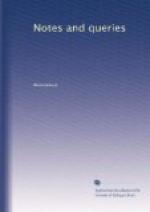In London the Parvis was frequented by serjeants at law: see Chaucer, Prol. Cant. Tales. There is a difference of opinion where it was situated: see Tyrwhitt’s Gloss. The student in ecclesiastical history may compare Leo Allatius de Templis Graecorum, p. 44.
T.J.
Autograph Mottoes of Richard Duke of Gloucester and Harry Duke of Buckingham. (No. 9. p. 138.)—There can be no doubt that “Mr. NICOLS” is somewhat wrong in his interpretation of the Duke of Buckingham’s Motto. It is evident that both mottoes are to be read continuously, and that “souene” is the third person singular of a verb having “loyaulte” for its nominative case. It appears to me that the true reading of the word is “soutienne,” and that the meaning of the motto is “My feelings of loyalty often sustain me in my duty to the King when I am tempted to join those who bear no good feeling towards him.” So that we shall have in English,
Loyalty binds me}
Richard Gloucester.}
Often sustains me}
Harry Buckingham.}
ARUN.
Boduc.—Your correspondent “P.” (No. 12, p. 185.) seems to consider the “prevailing opinion,” that Boduc or Boduoc on the British coin must be intended for our magnanimous Queen Boadicea, to be merely a “pleasing vision,” over which he is “sorry to cast a cloud.” Yet his own remark, that the name Budic (a mere difference in spelling) is often found among families of the Welsh in Brittany, and that the name was once common in England, serves only to confirm the common opinion that Boduoc on the coins was intended as the name of the British Queen.
Dio expressly writes her name in Greek Boudouica, which approaches nearly to Budic. In Cornwall we still find Budock, the name of a parish and of a saint. In Oxford there was a church formerly called from St. Budoc, long since destroyed. Leland mentions a Mr. Budok, and his manor place, and S. Budok Church. His opinion was, that “this Budocus was an Irisch man, and cam into Cornewalle, and ther dwellid.” Whether there was a Regulus of Britain of this name, is not material. I am not prepared to cast a cloud over it, if it should be found. Our motto should be, “ex fumo dare lucem,” &c.
ANTINEPHELEGERETA.
Oxford.
Annus Trabeationis.—I am sure that you will allow me to correct an oversight in your reply to a query of “G.P.,” in No. 7. p. 105. You have attributed to Du Cange a sentence in the Benedictine addition to his explanation of the term Trabeatio. (Glossar. tom. vi. col. 1158. Venet. 1740.) This word certainly signifies the Incarnation of Christ, an not his Crucifixion. Besides the occurrence of “trabea carnis indutus,” at the commencement of a sermon on S. Stephen by S. Fulgentius Ruspensis, I have just now met with the expressions, “trabea carnis velatus,” and “carnis trabea amicti,” in a copy of the editio princeps of the Latin version of Damascen’s books in defence of Image-worship, by Godefridus Tilmannus, fol. 30 b. 39 a, 4to. Paris, 1555.




